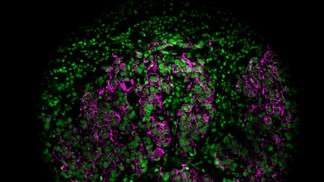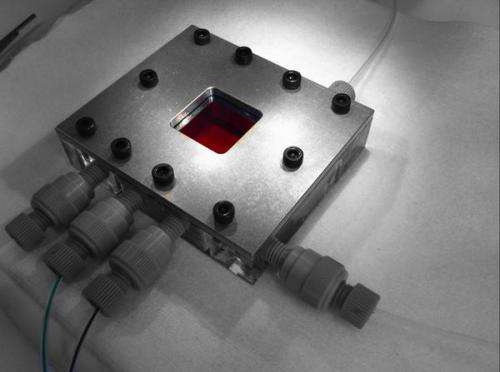High speed cancer profiling

(Phys.org) —Identify the type of cancer for patients with breast cancer in a few minutes. This is the challenge that EPFL researchers successfully met by presenting their new "microfluidic chip." Their research is written up in PNAS.
To effectively fight breast cancer and prescribe proper treatment, physicians must accurately identify the tumor that affects a patient. Accurate analysis of tumor tissue is critical to improving the chances of recovery.
Among a significant percentage of patients, the risk of metastasis is particularly expressed by the presence of an abnormal amount of protein HER2 on the surface of cancer cells. At EPFL, in collaboration with the Institute of Pathology at the Lausanne University Hospital (CHUV), scientists have developed a new in vitro system for extremely fast and reliable identification of these proteins in diseased tissues. This exceptionally precise analysis then enables healthcare providers to prescribe customized treatment which, when coupled with chemotherapy, is incredibly effective.
A diagnosis within minutes
Inexpensive and easy to use, the new diagnostic tool enables physicians to make an accurate assessment of the disease in a few minutes, in contrast to traditional methods which require several hours.

It comes in a chip made of silicon and glass, gridded by channels 100 microns in diameter (one thousandth of a millimeter). The principle is to make antibodies attach to the HER2 proteins of the cancerous tissue in order to detect them by fluorescence. Collected during surgery or by biopsy, cancerous tissues can be placed within the chip so as to be uniformly irrigated by the fluids. The sample of diseased tissue is then "washed" with a serum containing antibodies. Prior to this, the antibodies have been chemically modified to do nothing more than hang onto the HER2 protein. Using fluorescence, it is then possible to precisely detect the amount of proteins in place. The traditional detection methods of immunohistochemistry (IHC) are thus combined into a microfluidic system.
Ambiguous results in conventional methods of analysis
"Currently, tissue samples must be bathed for a long time in a solution full of antibodies, so that each part of the tissue is thoroughly exposed," says Martin Gijs, co-author of the publication and Director of the Laboratory of Microsystems (LMIS2). "But with this long period of immersion, it can happen that the antibodies disproportionately cling to targeted proteins or places where the proteins are not present, which gives ambiguous results. Frequently, complex and expensive genetic analysis (ISH) must then be additionally carried out." With the new chip, it becomes possible to irrigate the entire sample evenly and for a set time. "By completely controlling the flow of fluids, we can set the device to get exactly the irrigation time required to ensure that attachments between antibodies and targeted proteins are proportional," says Ata Tuna Ciftlik, lead author of the text. Thereby the results are not distorted by an unwanted binding of antibodies to the proteins.
Compelling experimental results already
The accuracy of the results obtained using the new chip are promising. To test their method, the researchers analyzed 76 tumor samples provided by the CHUV. The traditional method of analysis gave ambiguous results for 27 of them. With the microfluidic processor, only three results remained uncertain. The rest of the analysis proved 100% correct, and each analysis took less than five minutes.
"Initially, we tested our system with the HER2 protein, but the method could also be adapted to test other biomarkers involving different types of cancers," predicts Ata Tuna Ciftlik. After obtaining his doctorate, the researcher additionally hopes to found a start-up to commercialize his system. "We're in the process of raising funds for this project."
More information: Publication: Microfluidic processor allows rapid HER2 immunohistochemistry of breast carcinomas and significantly reduces ambiguous (2+) read-out
Journal information: Proceedings of the National Academy of Sciences
Provided by Ecole Polytechnique Federale de Lausanne

















